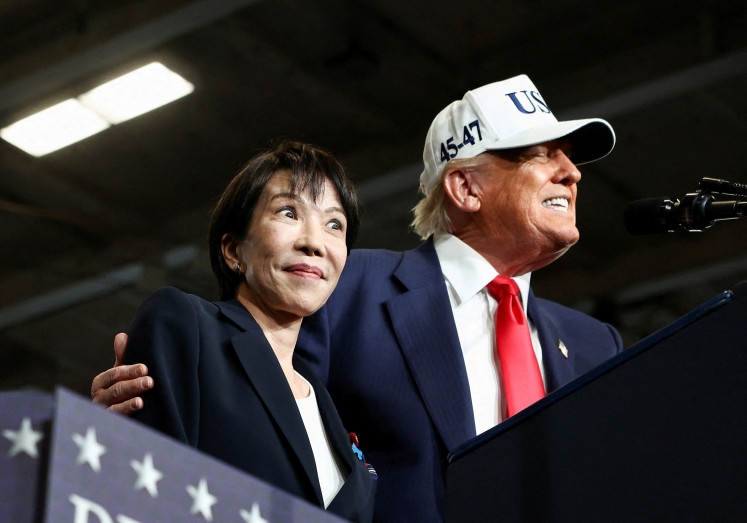Popular Reads
Top Results
Can't find what you're looking for?
View all search resultsPopular Reads
Top Results
Can't find what you're looking for?
View all search resultsStocks wobble, dollar edges down with tariff deadline in focus
The dollar retraced some of Thursday's gains with US markets already shut for the week, as traders considered the impact of the sweeping spending bill Trump is about to sign into law.
Change text size
Gift Premium Articles
to Anyone
M
ost Asian equity markets struggled on Friday, despite record highs for Wall Street overnight, as US President Donald Trump's deadline for trade deals loomed next week.
The dollar retraced some of Thursday's gains with US markets already shut for the week, as traders considered the impact of the sweeping spending bill Trump is about to sign into law.
Japan's Nikkei rose 0.3 percent after flipping between gains and losses in early trading.
Hong Kong's Hang Seng slumped 1.3 percent, while mainland Chinese blue chips edged slightly lower.
Taiwan's equity benchmark shed early gains to decline 0.2 percent. South Korea's KOSPI sank more than 1 percent.
US S&P 500 futures edged down 0.2 percent, following a 0.8 percent overnight advance for the cash index to a fresh all-time closing peak. Wall Street is closed Friday for Independence Day.
Investors cheered a surprisingly robust jobs report on Thursday in sending all three of the main US equity indexes climbing in a shortened session.
Following the close, the House narrowly approved Trump's signature, 869-page bill, which would add US$3.4 trillion to the nation's $36.2 trillion debt, according to the nonpartisan Congressional Budget Office.
Trump also said he would start sending out letters to trade partners with their tariff rates, as deals remained elusive ahead of the July 9 deadline.
The US President said he expected "a couple" more agreements after announcing a deal with Vietnam on Wednesday to add to framework agreements with China and Britain as the only successes so far.
US Treasury Secretary Scott Bessent said earlier this week that a deal with India is close. However, agreements with Japan and South Korea, once touted by the White House as likely to be among the earliest to be announced, appear to have broken down.
"It is now just waiting for July 9," said Tony Sycamore, an analyst at IG, with the market's lack of optimism for deals responsible for some of the equity weakness around the region, particularly Japan and South Korea.
At the same time, Thursday's jobs data shows "the US economy is holding together better than most people expected, which suggests to me that markets can easily continue to do better" from here, Sycamore said.
The jobs data saw traders take any expectations for a Federal Reserve interest rate cut this month off the table.
The US dollar rallied, taking it up as much as 0.7 percent versus a basket of major peers on Thursday before it pared its advance to end the session with a 0.4 percent rise.
Early on Friday, the US currency gave back a little of those gains, slipping 0.2 percent to 144.62 yen and edging down 0.1 percent to 0.7942 Swiss franc.
The euro added 0.1 percent to $1.1766, while sterling traded flat at $1.3650.
The US Treasury bond market is closed Friday for the holiday, but 10-year yields rose 4.7 basis points (bps) to 4.34 percent while the 2-year yield jumped 9.3 bps to 3.882 percent.
Gold inched up 0.1 percent to $3,329.54 per ounce.
Brent crude futures rose 1 cent to $68.81 a barrel, while US West Texas Intermediate crude firmed 3 cents to $67.03.










